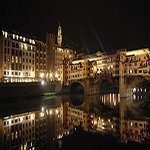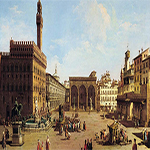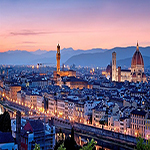Florence
Florence (Italian: Firenze $fi`r?ntse] ( listen), alternative obsolete form: Fiorenza; Latin: Florentia) is the capital city of the Italian region of Tuscany and of the province of Florence. It is the most populous city in Tuscany, with approximately 370,000 inhabitants, expanding to over 1.5 million in the metropolitan area.$2]
Florence is famous for its history: a centre of medieval European trade and finance and one of the wealthiest cities of the time,$3] it is considered the birthplace of the Renaissance, and has been called “the Athens of the Middle Ages”.$4] A turbulent political history includes periods of rule by the powerful Medici family, and numerous religious and republican revolutions.$5] From 1865-71 the city was the capital of the recently established Kingdom of Italy.
The Historic Centre of Florence attracts millions of tourists each year, and Euromonitor International ranked the city as the world`s 72nd most visited in 2009, with 1.7m visitors.$6] It was declared a World Heritage Site by UNESCO in 1982. Due to Florence`s artistic and architectural heritage, it has been ranked by Forbes as one of the most beautiful cities in the world,$7] and the city is noted for its culture, Renaissance art and architecture and monuments.$8] The city also contains numerous museums and art galleries, such as the Uffizi Gallery and the Palazzo Pitti, amongst others, and still exerts an influence in the fields of art, culture and politics.$9]
Florence is an important city in Italian fashion,$9] being ranked in the top 50 fashion capitals of the world;$10] furthermore, it is a major national economic centre,$9] as a tourist and industrial hub. In 2008, the city had the 17th highest average income in Italy.
Florence originated as a Roman city, and later, after a period as a flourishing trading and banking medieval commune, it was the birthplace of the Italian Renaissance (or the “Florentine Renaissance”). According to the Encyclopædia Britannica, it was politically, economically, and culturally one of the most important cities in Europe and the world from the 14th to 16th centuries.$8]
The language spoken in the city during the 14th century was, and still is, accepted as the Italian language. Almost all the writers and poets in Italian literature of the golden age are in some way connected with Florence, leading ultimately to the adoption of the Florentine dialect, above all the local dialects, as a literary language of choice.$12]
Starting from the late Middle Ages, Florentine money—in the form of the gold florin—financed the development of industry all over Europe, from Britain to Bruges, to Lyon and Hungary. Florentine bankers financed the English kings during the Hundred Years War, as well as the papacy, including the construction of their provisional capital of Avignon and, after their return to Rome, the reconstruction and Renaissance embellishment of the latter.
Florence was home to the Medici, one of history`s most important noble families. Lorenzo de` Medici was considered a political and cultural mastermind of Italy in the late 15th century. Two members of the family were popes in the early 16th century: Leo X and Clement VII. Catherine de Medici married king Henry II of France and, after his death in 1559, reigned as regent in France. The Medici reigned as Grand Dukes of Tuscany, starting with Cosimo I de` Medici in 1569 and ending with the death of Gian Gastone de` Medici in 1737.
Distance: 120 Km








